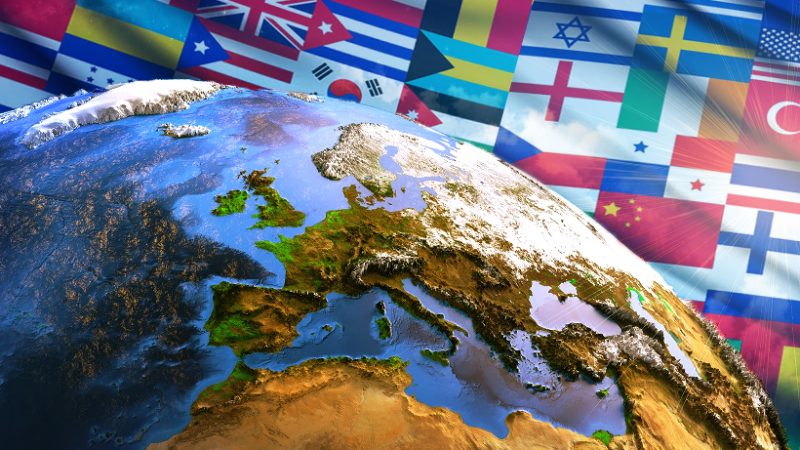The well-known statement: “Geography determines fate!” is attributed to Ibn Khaldun. His believed that the fate of a people is closely connected with the geography of their homeland. For example, the ruler of Russia, regardless of whether we are talking about Peter the Great or Vladimir Putin, must consider the plains of the Northern Europe as an issue of their own “existential threat”. It is natural that every Russian leader has looked to the land between Poland and Ukraine, because history itself has pointed them in this direction. The leader, who wants to preserve Russia, is forced to concentrate his attention on the plains of Northern Europe.
In China the situation is no different. It doesn’t matter who rules the country, the leadership will focus on Tibet. Waking up in the morning, any given Chinese leader will look towards the mountains of Tibet. If the leadership intends to open China to the world, he is forced to develop and attach major importance to something like the “One belt, one road” policy: geographic conditions have stipulated the decision regardless of the individual will of the leader.
It goes without saying that the same applies to the United States: the countries’ destiny depends above all on its location. Regardless of who is in power, decisions are made not by individual volition, but geography. American presidents have always kept a close eye on Cuba. In this respect, the “Caribbean crisis” is not just a name, it is a reflection of a fear rooted in the minds of all American leaders.
In simple words, the destiny of each nation is formed by its geography. If you live in a place with four sides surrounded by mountains, then it is unlikely that many attempted to conquer you for some time in your history, yet it is equally unlikely that your nation struck out to become an Empire. If a country wants to become something more than a regional power, but is not equipped with deep ports, waterways or shopping centers, they can only dream of expansion.
Therefore, land which other countries might simply call “rocky” can mean the struggle for existence of those who actually live there. For example, the islands of Kardak (Imia), in the eyes of a typical American are simply islands– but for Turkey, the islands of Kardak mean the entire Aegean Sea. If you can not protect the islands of Kardak, you will not be able to open a single sail there.
That is, a countries’ geography is more decisive than its leadership. In fact, this is the true meaning of “geopolitics”. Looking at the relations of geography and politics we can come to the following conclusion: “If one state wants to extend its influence on the territory of another state, and the latter considers this territory ‘a matter of its viability’, then conflict becomes inevitable. Conflict may even be welcomed!
For example, if Greece declares that it wants to move the border of its territorial waters 12 miles, they can cut right to chase and say: “I declare war on Turkey!” Because they know Turkey will never agree with the decision. The same applies to the South China Sea. To close the sea to China means to declare war on China. Because of this, China is working daily to take over the majority of the South China Sea, and constantly monitoring its neighbors in area.
As we will seen later, each state has its “urgent needs” or “issues of vitality”, stemming from geography and established in the course of history. For this reason, no matter how much time has passed, certain questions remain sensitive.
Let’s take another example from recent history: the “Kurdish Corridor” or “Independent Kurdistan”, which the US actively supports, for countries of the region, that is, for Iran, Iraq, Syria and Turkey, is a “viability issue”. Of course, this is not the only problem. Obviously, a Kurdish state dependent on the United States would create chaos in the region for hundreds of years, and would also threaten the economic and military interests of Russia and China. In addition, the creation of a Kurdish state in the very center of the Middle East means the split of the “One belt – one way” project, and will reduce Russia’s influence on this region and the Caucasus. The Russians will not be able to stay in Tartus and will quickly find themselves “encircled”.
Based on these examples, we can arrive at the following conclusion: at the heart of all of these recent clashes, there are “geopolitical factors”. The US is very well aware of what their actions means for a given country, specifically targeting regions that are “a matter of vitality” for their competitors. Because they are aware of the importance of these questions for their enemies, they tackle these issues one by one, in order to divide and conquer.
First they watched how the Balkans disintegrated, and immediately afterward setup similar experiments in Georgia and Ukraine. Simultaneously, an invasion took place, on one side in Afghanistan, and in Iraq and Syria on the other. Immediately after we saw how they arm, train and support terrorist organizations such as the Kurdistan Workers’ Party (PKK), the Democratic Union (PYD) and the People’s Self-Defense Forces (YPG). Having received what is essentially the “gift” of armed forces in the region, which they refer to as “our land forces”, these troops have begun to be ordered to the right places at the right times. Naturally, as long as the situation persists, the U.S. will continue to ignore the crimes, torture, ethnic cleansing, murder and resettlement committed by PKK, PYD and YPG.
This should make the geopolitical fault lines perfectly clear: on the one hand – the US and the PKK, PYD and YPG, which they support, and on the other hand – every country in the region, plus Russia and China! Judging by these facts, one important question remains: Do all these countries understand that their fate is being determined by geography, or do they think that the destiny of the whole region is decided by those who are thousands of miles away?
We are convinced that either the countries of the region collectively protect their territories, or they will lose them one by one. For regional leaders, the best way to proceed is to closely monitor the course of their history. If they look back, they will understand that geography has certain unchanging laws. Those leaders who can learn from history will never forget about their people.









Leave a Reply